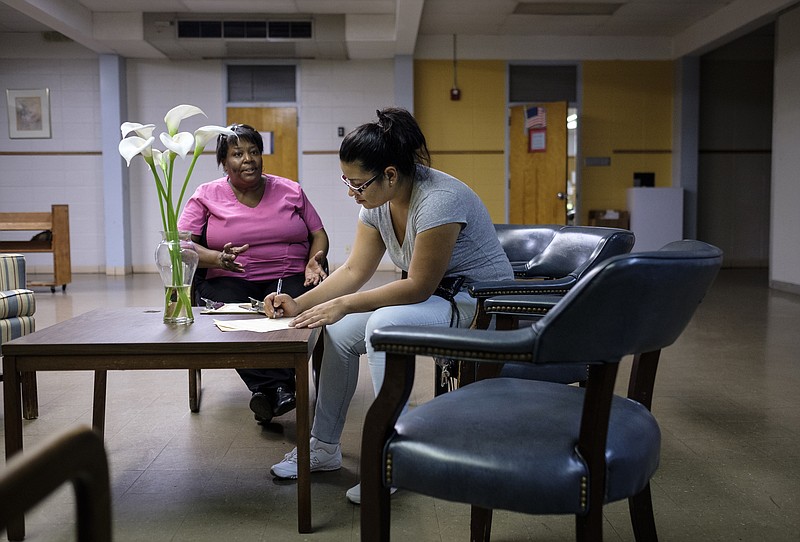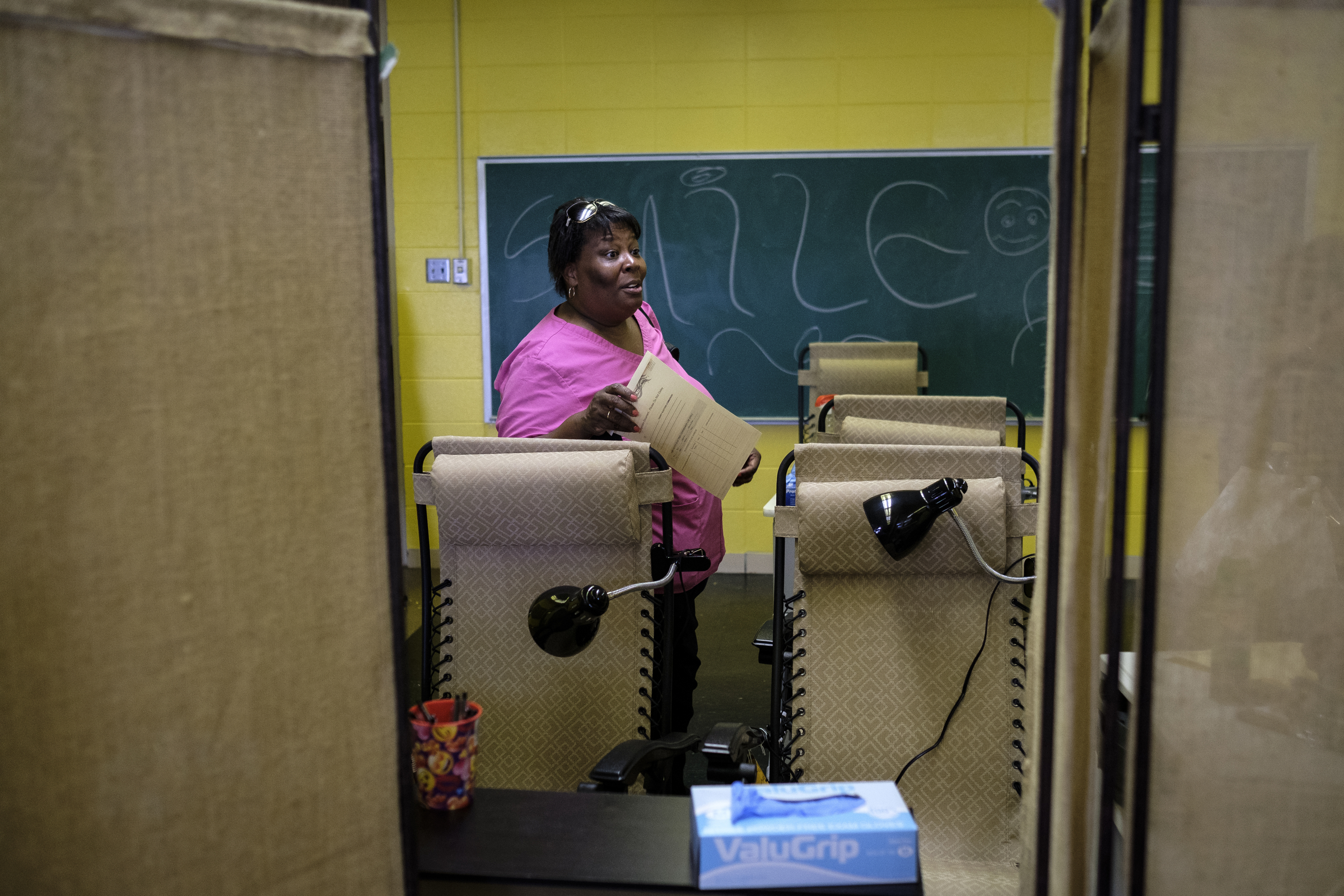Get registered
To schedule a voter registration drive with the NAACP call 423-280-0083 or email naacpchattanooga@epbfi.com.
Important dates
Early voting ends July 30. The county general and state/federal primary election is Aug. 4. The general election is Nov. 8.
Local NAACP officials say it's getting harder for poor people and people of color to vote, and they point to Tennessee's 2011 voter ID law as part of the problem.
"This year, we determine if America is a place for everyone or a place for a few," said City Councilman Yusuf Hakeem, who spoke at the NAACP's State of the Vote 2016 meeting this month.
"Some of the obvious things that should tell us how important voting is, is the effort to keep people from voting, like the new voting ID Laws," Hakeem said. "We don't want to give people looking to the past a free ride by not even going to the polls."
The website WalletHub says Tennessee's black voters are among the least politically engaged in the nation. The website said its research showed Tennessee ranked 43rd among 48 states for black turnout.
And Ballotpedia ranks Tennessee's voter ID law as among the strictest in the country. It's among 10 states that require a government-issued photo ID to cast a ballot, whether voting early or on Election Day.
The Brennan Center for Justice at New York University School of Law says other states have restricted voter registration or limited dates and hours for early voting.
Tennessee Secretary of State Tre Hargett said the voter ID laws are not intended to hinder eligible voters, but to eliminate fraud.
When state lawmakers passed the photo ID law in 2011 its Senate sponsor, Republican Bill Ketron of Murfreesboro, cited fraud in the 2006 special election Sen. Ophelia Ford, D-Memphis. , in 2006. The state election coordinator also said several hundred felons had voted after being removed from the rolls in 2009.
"I can think of nothing that will disenfranchise a voter more than finding out somebody who was ineligible to vote voted in an election," Hargett said by phone last week.
Hargett said the vote of an ineligible voter could cancel out a legitimate vote.
But, Hakeem said, instead of reducing fraud, the voter ID laws could result in more poor, elderly and minority voters not voting.
In 2011, Chattanooga resident Dorothy Cooper made national news when she went to get her photo voter ID at a driver services center.
The 96-year-old brought along a rent receipt, a copy of her lease, her voter registration card and her birth certificate, but was denied the photo ID because her birth certificate was in her maiden name and Cooper didn't show her marriage certificate. After a lot of national attention and the personal intervention of Tennessee Senate Speaker Ron Ramsey, Cooper got her ID and was allowed to vote.
The next year, the local NAACP reported that some 625,000 people in the state did not have the required identification to vote, and only about 12,000 got the IDs in the first year.
Opponents of strict voter ID laws say they are a solution in search of a problem.
An Arizona State University study of voter fraud convictions from 2000 to 2014 found just 28 cases, according to a 2014 PBS Frontline report. Of those, 14 percent involved absentee ballot fraud. Only 3.6 percent involved voter impersonation, which voter ID laws aim to prevent.
But the laws do have an effect on turnout, according to news reports.
Democratic turnout drops by an estimated 8.8 percentage points in general elections when strict photo ID laws are in place, compared to just 3.6 percentage points for Republicans. Researchers also found that in primary elections, a strict ID law could be expected to depress Latino turnout by 9.3 points, black turnout by 8.6 points and Asian-American turnout by 12.5 points, according to reports.
For the upcoming elections and all future elections, the local NAACP will push to get as many residents as possible to vote, chapter secretary Eric Atkins said.
The civil rights organization is hosting monthly registration drives, asking pastors to encourage voting and petitioning state officials for early voting on Sundays to ensure voting opportunities.
"We are fighting for an expansion of early voting," he said. "We're fighting for college students to have school IDs permissible and we're fighting to have at least one day of Sunday voting during early voting."
The organization hosted a voter registration drive at the Alton Park Latino Festival and is asking churches and neighborhood leaders to invite the NAACP to do voter registration drives at their locations.
It asks that each church has a voter empowerment coordinator to make sure people are prepared to vote and that they get to the polls.
The group also sent a letter to the Tennessee Secretary of State's office petitioning for voting on Sunday during early voting in Hamilton County. The NAACP calls the movement "Souls to the Polls."
Hargett said he has not seen the letter, but the petition should start with state legislators because it would require a change in the law.
Hakeem said the Men's Fellowship at his church, Second Missionary Baptist, hosts regular voter registration drives and will transport some residents to polls during the upcoming elections.
Local NAACP President Elenora also encouraged graduating high school seniors to register. She said the Chattanooga Civic Center at Mountainside on Hooker Road keeps voter registration forms on hand. It also has forms to get voting rights restored for people who have criminal records.
Instead of accepting inequality, minorities should collectively vote for representatives who prioritize issues that affect them, such as economic and educational inequality, Woods said.
"If you're unhappy with your school, with where you live, if you don't like your elected leaders, then you are the main one who needs to go to the poll," Woods said. "Get together with other people who think like you and vote someone in who represents you."
Contact staff writer Yolanda Putman at yputman@timesfreepress.com or 423-757-6431.

